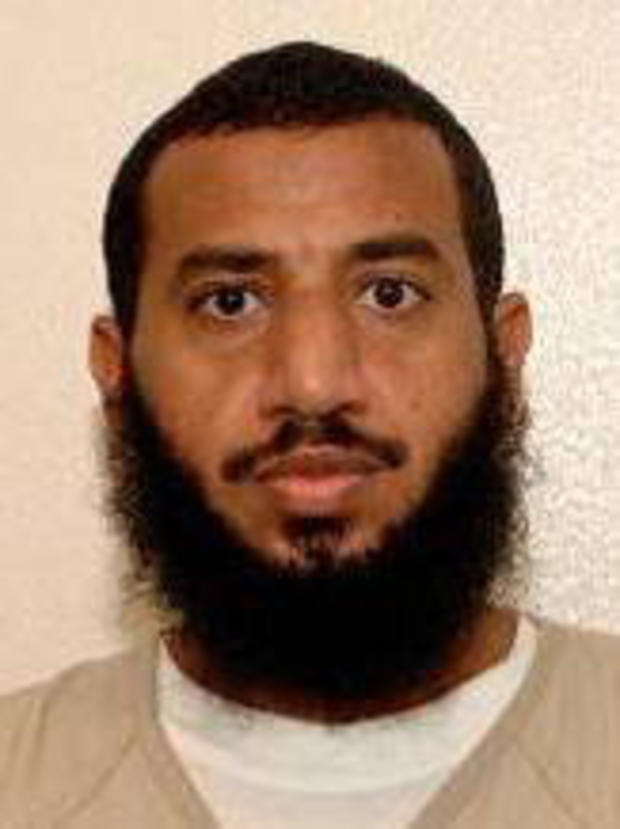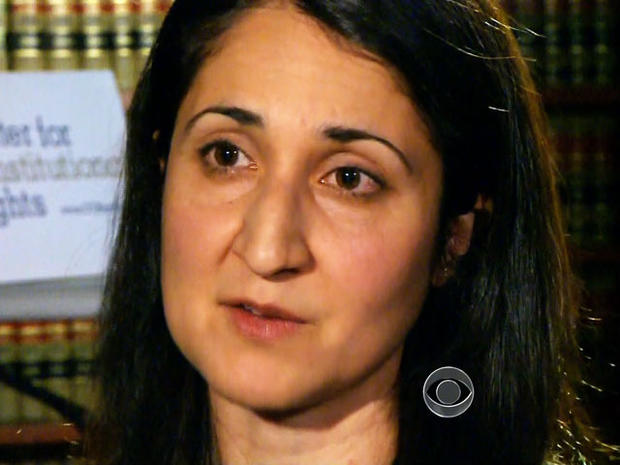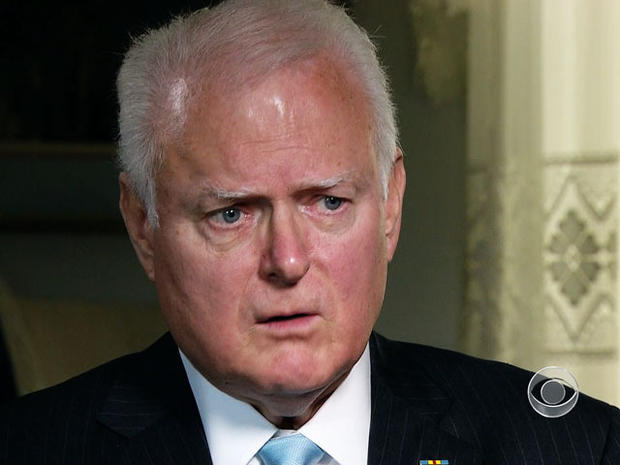Twenty-three Guantanamo hunger strikers being force-fed
(CBS News) NEW YORK -- Sabry Mohammed is one of at least 100 men participating in a mass hunger strike at the U.S. military prison at Guantanamo Bay, Cuba.
"He told me, 'I don't not want not eat, I don't want to starve myself. I don't want to die, I want to see my family, but I have been pushed too far,'" his attorney, Pardiss Kebriaei, told CBS News "I think that describes the mental state of many of the men at Guantanamo."
Kebriaei is a senior attorney with the Center for Constitutional Rights, which represents eight current detainees and has challenged the legal basis for the prison camp since it opened in 2002. Since 2007, she has made dozens of visits to Guantanamo and is planning to go back this month. She last saw Mohammed, 43, from Yemen, in April. This month marks his 11th year at Guantanamo.
"He is in a very weak state," Kebriaei said. He'd lost 30 pounds. "He felt he had no other resort, no other way of being heard."
Kebriaei authored a letter to Defense Secretary Chuck Hagel six weeks ago, co-signed by 50 other attorneys, expressing "urgent and grave concern" over the detainee hunger strike. Since then, the number of hunger strikers acknowledged by the military has quadrupled.
On Wednesday, the military was force-feeding 23 hunger striking detainees in an effort to prevent them from dying. Forty medics and nurses arrived at the base this week as reinforcements.
"I think at this point they feel their only way out of Guantanamo is in a coffin," Kebriaei said of the detainees. "It is absolutely part of the broader frustration of men who have now been detained without charge for eleven-and-a-half years, who have been promised by President Obama that the prison would be closed within a year, who know that 86 of their fellow prisoners have been approved to leave and who still don't know when, if ever, they are going home."
Mohammed, like the majority of men still detained at Guantanamo, has never been charged with a crime. He is on a 2010 Justice Department list of detainees cleared for release.
The list resulted from an Obama administration task force that reviewed and categorized all detainees. A majority of those approved for transfer are Yemenis, but President Barack Obama banned transfers to Yemen in 2010, following a string of terrorist plots originating from there and the deteriorating security situation in the country.
Below: White House details Guantanamo closure options.
In its first two years, the Obama administration released 71 men from Guantanamo, including 40 men repatriated to 17 third countries. Then the releases stopped, and in January, the administration eliminated the position of a State Department envoy handling repatriations.
Djamel Ameziane, 46, from Algeria, is another Kebriaei client approved for transfer who is refusing his meals.
"He languishes at Guantanamo," Kebriaei said. "There are European countries willing to take him, willing to take him in, and the administration is the one that has not acted."
In March, Marine General John Kelly, who heads the U.S. Southern Command which oversees the Guantanamo base, told Congress the detainees "had great optimism that Guantanamo would be closed" and "they were devastated when the president backed off."
The promised Periodic Review Boards for detainee cases, comprised of Defense, State and Justice Department personnel, have yet to launch.
Guantanamo Bay hunger strikers at 100, U.S. says
U.S. military defends Guantanamo prison raid
11 years in Guantanamo without trial or charges
Indefinite detention without charges remains the main reason so many detainees are engaged in a hunger strike, detainee attorneys have said. Only six of the 166 men held, face charges by military commissions -- five men for the September 11 terror attacks and one man for the 2000 attack on the USS Cole.
Seven men have been convicted by military commissions that substitute for federal court trials at the base, while nine men have died there. The last, Adnan Latif, who had been approved for transfer, committed suicide last September.
Detainee attorneys say the trigger for the hunger strike was an early February cell shakedown in Camp Six. Until then, Camp Six was Guantanamo's most communal and populous camp, with 130 detainees whose cells were unlocked during the day and who had access to a recreation yard.
That yard became the site of an altercation in January resulting in one guard firing rubber bullets at detainees, raising tensions, detainee attorneys have said.
Below: U.K. resident Shaker Aamer has been imprisoned for 11 years without facing any charges, Mark Phillips reports.
Then, the cell searches resulted in the confiscation of detainee photos, letters, legal papers and comfort items; guards thumbed through detainees' Korans for contraband, their attorneys have said.
Guards again fired rubber bullets at detainees during an April 13 pre-dawn raid on Camp Six, which the military said was intended to remove obstructions to most security cameras.
Since then, Camp Six has been under lockdown, with even compliant detainees confined to their cells 22 hours a day. The number of hunger strikers at Guantanamo has doubled.
The American Medical Association and International Committee of the Red Cross oppose force feeding.
Kebriaei called it "cruel" and described what the procedure is like: "It involves strapping men into chairs that the manufacturer calls padded cells on wheels. They're strapped in at several points -- at their ankles, their wrists, their waist, their shoulders. They sit strapped in like that while a thick tube is forcibly inserted up their noses, down their throats, and into their stomachs. They're strapped in like that while liquid formula is pumped into their stomachs for an hour. That's how we're saving life Guantanamo."
On Wednesday, the United Nations Office of the High Commissioner on Human Rights denounced indefinite detention without charges as "a flagrant violation of international human rights law" that "constitutes a form of cruel, inhuman, and degrading treatment."
UNHCHR said the prolonged detention resulted in "lasting physiological and psychological damage caused by the detainees' high degree of uncertainty over basic aspects of their lives, such as knowing whether or not they will be tried; whether they will be released and when; or whether they will see their family members again."
Below: Obama revives push to close Guantanamo Bay, Bill Plante reports.
Responding to a question posed by CBS News White House correspondent Bill Plante Tuesday, Obama told reporters his goal remains to close Guantanamo, pursuant to a 2008 campaign promise and a 2009 executive order.
Since then, Congress passed laws prohibiting detainee transfers to the mainland for trial or incarceration and raised the bar on detainee transfers by requiring the defense secretary to personally certify in writing that a detainee would never take action against the United States and that a receiving country agreed to monitor the individuals.
"I'm going to re-engage with Congress to try to make the case that this is not something that's in the best interests of the American people, and it's not sustainable," Obama said, referring to continued operation of the detention center. "I'm going to ask some folks over there who, you know, care about fighting terrorism but also care about who we are as a people to step up and help me on it."
Before the president's remarks, Senate Intelligence Committee Chair Dianne Feinstein had written to National Security Adviser Tom Donilon asking the White House to reexamine its ban on detainee transfers to Yemen.
However, retired U.S. Air Force General Thomas Hemingway, who oversaw a review of detainee cases in 2007, told CBS News Guantanamo still serves a purpose.
"I don't see another viable alternative right now to its existence," Hemingway said. Historically, he said, such as during World War II, not all captured enemy combatants faced military trials, and many Guantanamo detainees captured in Afghanistan were affiliated with al Qaeda, even if there is scarce evidence to charge them with specific war crimes.
"I think all of the people who are currently in Guantanamo are belligerents. They are not people who ended up at the wrong place at the wrong time, other than perhaps the wrong training camp at the beginning of the conflict," Hemingway said. "I don't think we have anybody down there who was captured by mistake."
Hemingway said the cases were complex, as were decisions over who to release. He said, "There are some people who we feel are reasonable risks to release, but we've had great difficulty getting any other countries to accept their presence, even those countries where they were citizens."
In Washington, CBS News Correspondent David Martin and Producer Mary Walsh contributed to this story.


